Nuno felting
Nuno felting is a fabric felting technique developed by Polly Stirling, a fiber artist from New South Wales, Australia, around 1992. The name is derived from the Japanese word "nuno" meaning cloth.[1] The technique bonds loose fibre, usually wool, into a sheer fabric such as silk gauze, creating a lightweight felt. The fibres can completely cover the background fabric, or they may be used as a decorative design that allows the backing fabric to show. Nuno felting often incorporates several layers of loose fibres combined to build up colour, texture, and/or design elements in the finished fabric.
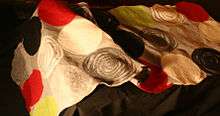
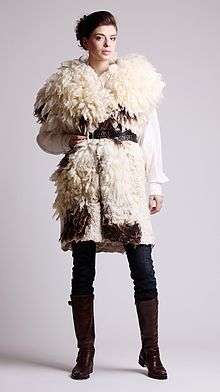
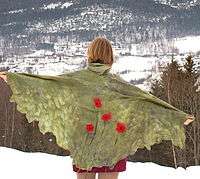
The nuno felting process is particularly suitable for creating lightweight fabrics used to make clothing. The use of silk or other stable fabric in the felt creates fabric that will not stretch out of shape. Fabrics such as nylon, muslin, or other open weaves can be used as the felting background, resulting in a wide range of textural effects and colours.
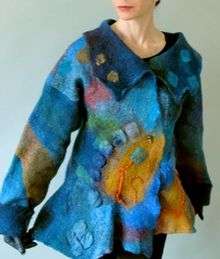
Nuno felting creates an extremely versatile fabric. It can be made in many weights to accommodate many different uses. It can be made much lighter in weight than traditional all-wool felt accounting for its movement and drape. Because of the range of weights possible with the cloth very diverse garments can be made.
A light weight nuno fabric is made by laying one layer of loose fiber onto an open weave fabric base, creating fabric suitable for a summer dress. A much heavier nuno fabric results from laying 3-4 layers of loose fibers onto an open weave base creating fabric suitable for a winter coat. A pair of boots could be made using even more layers of fibers.
Wool is only one kind of fiber that can be used in making this nonwoven cloth. There are many different wools and fibers to choose from, each with its own unique properties and handling abilities. Different fibers create different surface textures. Other types of fiber that will felt other than sheep's wool are: camel, llama, alpaca, Mohair goat, Cashmere goat, yak, Angora rabbit, beaver, dog, cat, human hair (think dreadlocks).
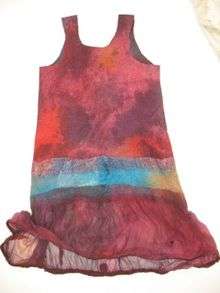
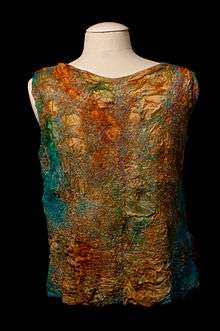
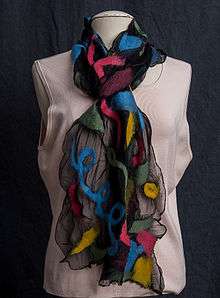
References
- Ziek, B. (2004). The felt frontier: I: Polly Stirling: Contemporary feltmaker. Surface Design Journal, 28(4), 35-38
Giles, Jenne (2010). "Felt Fashion" Quarry Books., MA ISBN 978-1-59253-608-5
White, Christine(2007)."Uniquely Felt" Storey Publishing, MA ISBN 978-1-58017-673-6